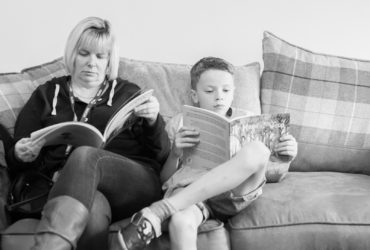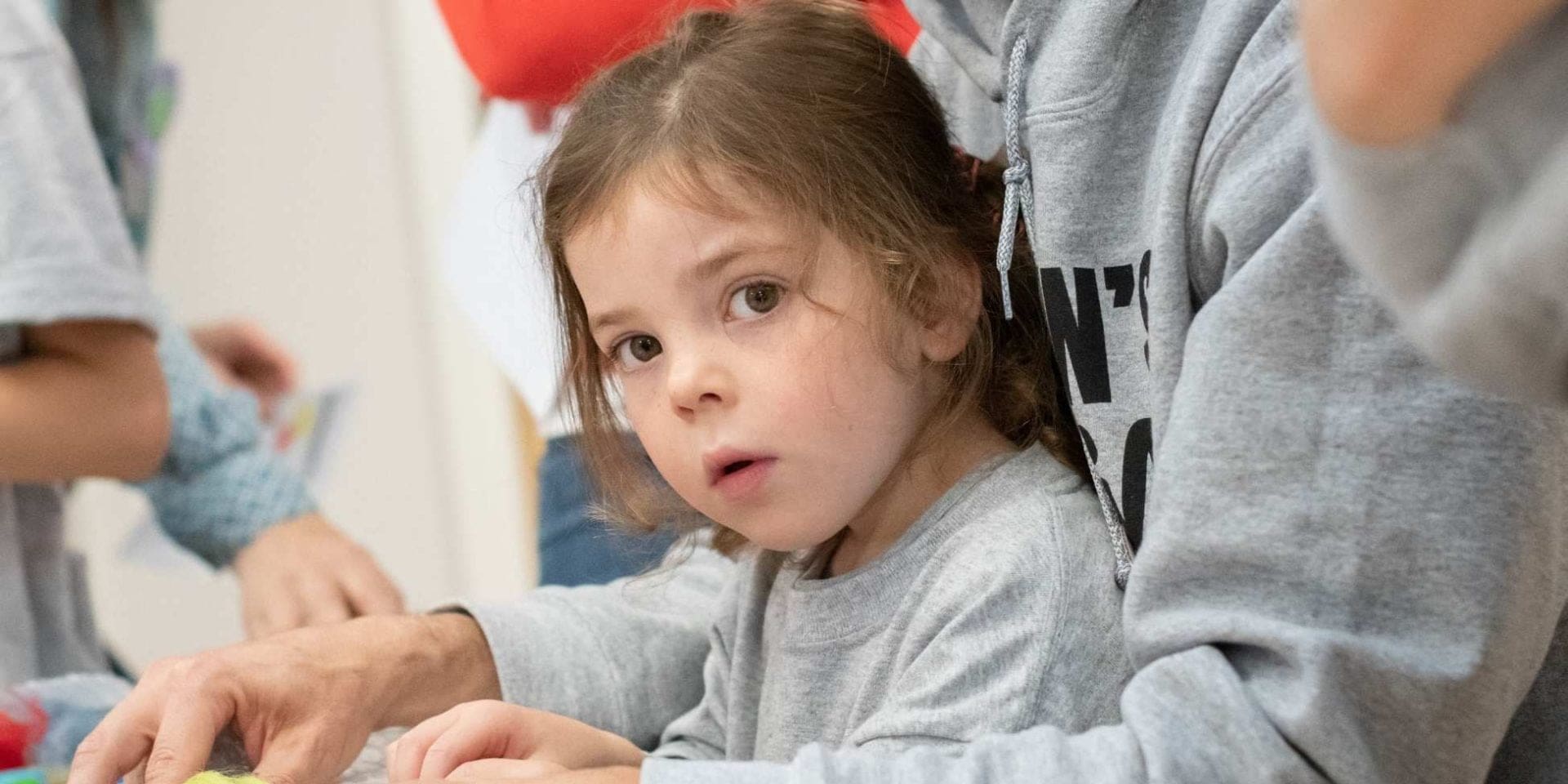Telling a child someone has died may be the hardest thing you ever do and often one of the first questions is ‘how much should I tell them?’ It’s normal to worry about making things worse by saying too much or the wrong thing but remember the worst has already happened. Our team at Winston’s Wish are on hand to help guide you through and suggest some gentle and caring ways in which to approach telling a child that someone they love has died.
Often adults want to protect children from death and it’s normal to think that children need to be shielded. However, in reality children are very aware and will pick up when something as enormous as a death has occurred.
Use clear language when telling a child someone has died
It’s better to use clear and direct language with children. Use the words ‘died’ and ‘dead’ rather than ‘passed away’ or ‘lost’ when telling them. These terms can lead to confusion, especially in younger children who may wonder if they can go and find a person who is now ‘lost’.
From our experience, it is better to be open, honest and direct when a loved one has died. In the absence of clear information children tend to ‘fill in the gaps’ to try and make sense of what is happening. This can mean that children imagine all sorts of things about a death, which are often worse than the reality.
Build up information like a jigsaw when explaining
You don’t need to give children all of the information in one go. When telling a child someone has died it’s best to give them information in smaller chunks that are more manageable and build it up like a jigsaw.
For example, very young children start to build puzzles with just a few blocks and for them ‘Mummy has died’ and ‘it’s really sad’ might be enough to begin with. As they develop and get older children will require more information to make sense of the puzzle. For example, you might explain how a person has died and could say ‘Mummy’s heart stopped working which meant her body became broken’.
Let them ask questions about what happened
If children are older it is also important to ask them how much information they would like to receive, for example, ‘would you like to know what happened at the hospital?’.
Letting children know they can ask more questions in the future is also important, this tells them that they can rely on the adults around them to provide the truth at a confusing time. Even if you do not know the answers immediately you can reassure children and let them know you’ll try to find out.
It’s not uncommon for young children to ask lots of repetitive questions. This doesn’t mean they haven’t listened or that you haven’t explained it well enough. This is just how children work out what’s going on.
Ways to explain to a child that someone has died
Some suggested words:
“We know that all living things will die someday. Flowers, animals, trees, butterflies, people all die eventually…”
“… however, the great majority of people will die when they are very old.”
“Occasionally, someone will die before they are old because, for example, of an accident or serious illness.”
“When someone dies, their body stops working and they are no longer able to do the things they could when they were alive, such as move or talk or hug or play.”
“Sadly, [name] has died. Everyone wishes they had not died and had lived for many more years. However, their body was not able to keep working and so they died. Their heart stopped beating, their lungs stopped breathing and their brain stopped thinking, and so they died.”
“We are very healthy and we’re going to do all we can to keep that way, because I want to be around to [play with my great grandchildren/travel to Mars/celebrate the year 2100].”
How to explain death to a child
Death can be a difficult concept for children to understand and it can be equally difficult to know how to begin to explain it. Children understand death differently at each stage of development.
Explaining death to a young child can be easier if you first help them understand the idea of ‘living’ and ‘alive’. Identifying the differences between living and dead is easier if you find examples in nature to show children. Start by spotting living things together and talk about what the see – are there particular movements or noises? You can explain that these are signs of being alive.
Encourage the child to think about other things that happen when you are alive, such as a heart that is beating and a brain that is thinking. This can help them make connections to humans. Ask the child to think about what else shows that we are alive – perhaps the way we move or do things.
Now, find dead insects and ask a child to see what they aren’t doing compared to the living ones. This can help them understand the different between alive and dead. You can then explain that their heart is no longer beating and their brain is no longer working and these things mean that they are dead and cannot come back. This helps them understand that the creature is not asleep.
It’s important for children to understand the life cycle and that everyone will change from being alive to being dead at some point, but that most people die when they are older. Some children can worry that something they did or said has caused a death. So explaining to a child that our thoughts or words won’t cause somebody to die can help.
How might children and young people react to the death?
Although they will feel it just as deeply, children will experience and express grief in different ways to adults. This means they might react quite differently to how adults would or how you might expect. Initial reactions to the news of a death may vary greatly from considerable distress, to finding it hard to speak, or they may not react very much at all.
Young children in particular, tend to ‘jump’ in and out of their grief – a little like jumping in and out of a puddle – leaping from feeling very upset and distressed one moment to wanting to know what’s for tea or whether they can play football, for example. The reason for this is that children need a break from the powerful emotions that accompany their grief and so are able to jump out of them for a while in order that they are not overwhelmed.
Whilst this can be difficult for adults to understand and to keep up with, it is very normal and it doesn’t mean that your child doesn’t care or isn’t impacted by what has happened. It may take them some time to process what has happened and they might need some help in finding ways to express how it feels for them.
It is common for young children to need to hear this person isn’t coming back a few times. They may ask questions like ‘will they be back for my birthday?’. Giving a child the space to talk or ask questions about the person who has died can also help them understand the finality of death.
It is also common for children to experience guilt when a brother or sister has died. This may be guilt that they have in some way contributed to their death or guilt at being alive. Children need reassurance to understand the death was not their fault.
How to help children and young people explore their emotions
Children will look to the adults around them to make sense of grief and try to understand how they should react. Often people worry about children seeing them upset as are worried they’ll make things worse.
Grief is complicated and adults and children can experience a range of emotions. It isn’t going to damage a child if they see you cry, however more extreme grief reactions might be frightening to them. It’s ok to explore feelings with children and can give them permission to explore their own with you too. For example, you could say ‘Mummy is crying because I feel really sad because Daddy died and I miss him’.
Saying things out loud helps children understand and be aware of what is happening in their world. Just as adults try to protect children from their grief, children instinctively do the same and may be worried about showing how they are really feeling. With encouragement it is possible to help children explore their grief rather than keeping emotions locked away, which can make grief more complicated.
It is normal for parents to struggle to be available for children due to their own grief when another child has died. However, children manage this change better if clear information is given about what is happening and why. For example, you could say ‘Mummy is finding today really difficult as I’m feeling really sad that Tom died’.
There will be times or days when communicating clearly like this feels easier and times it feels really hard. Look after yourself and do what you feel able too, when you can. However, speaking honestly with children can help them feel included and valued at a time when life is really difficult. In time you can explore feelings together but it is ok if you notice you are grieving differently too.
Where to get support
If you are a bereaved young person or you are supporting a child or young person (aged 0-25) who is struggling with their grief, please call our Freephone Helpline team on 08088 020 021 or email ask@winstonswish.org. We can provide advice, support and resources.
If you need urgent support, the Winston’s Wish Crisis Messenger is available 24/7 for free, confidential support in a crisis. Text WW to 85258.
Other articles you might find helpful

Activities for bereaved children
Free activities to help grieving children and young people.

Publications and resources
Our specialist publications for adults supporting bereaved children.


